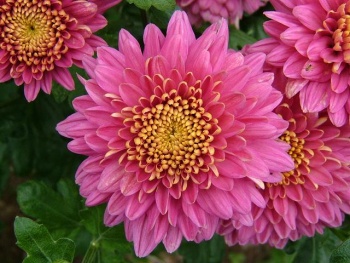Chrysanthemum
Other Names: Anthemis grandiflorum, Anthemis stipulacea, Chrysanthème, Chrysanthème des Jardins, Chrysanthemum indicum, Chrysanthemum sinense, Chrysanthemum stipulaceum, Chrysanthemum morifolium, Crisantemo, Dendranthema grandiflorum, Dendranthema morifolium, Fleur d’Or, Florist's Chrysanthemum, Flos Chrysantemi, Ju Hua, Matricaria morifolia, Mum, Yao Jiu Ha, Ye Ju Hua.
Chrysanthemum (mum) is a plant. It gets its name from the Greek words for “gold” and “flower.” People use the flowers to make medicine. The benefits of long-term consumption of Chrysanthemum tea have been recognized throughout the history of Chinese medicine. It is said to prevent aging and to be a favorite of Taoists and poets, though the benefits are achieved only with drinking the tea over a long period of time. In the Shen Nong Ben Cao Jing, it says, "taken over a long time it facilitates the qi and blood, lightens the body and prevents aging." Chen Shi-Dou explains: "Sweet Ju Hua is light and clear in flavor and nature, and its effect is particularly leisurely, it must be taken over a long time before it starts to take effect, one cannot just take more to try for earlier results."
Special Precautions of Chrysanthemum
- There isn't enough information to know if chrysanthemum is safe. Chrysanthemum can cause skin to become extra sensitive to the sun. Wear sunblock outside, especially if you are light-skinned.
- Pregnancy and breast -feeding: Not enough is known about the use of chrysanthemum during pregnancy and breast-feeding. Stay on the safe side and avoid use.
- Plant allergies: Chrysanthemum is a member of the Asteraceae/Compositae family of plants and may cause an allergic reaction in sensitive people. Other members of this family include ragweed, marigolds, daisies, and many others. If you have allergies, be sure to check with your healthcare provider before taking chrysanthemum.
The benefits of Chrysanthemum are
Especially useful during the spring and summer months, it cools the body and clears the liver. During the hot summer season, chrysanthemum tea is frequently consumed to dispel bodily heat without dampening digestion. It is also useful for fevers in the early stages of illness. The tea also supports immunity, reduces high blood pressure, relaxes the nervous system and curbs aging. Cultivated by the Chinese for over 3,000 years and readily prescribed by TCM practitioners, this trusted herb can heal a multitude of health complaints.
- Chest pain (angina).
- High blood pressure.
- Diabetes.
- Fevers .
- Headache.
- Dizziness.
- Prostate cancer : Chrysanthemin, which is the 3-glucoside of cyanidin, is a member of the anthocyanin class of natural products. According to an MTT assay (a colorimetric assay for assessing cell metabolic activity), chrysanthemin tends to inhibit the growth of prostate cancer cells, inducing dose-dependent and time-dependent cytotoxic effects in them.
- TCM utilizes the herb to quiet anxiety and balance the nerves. Since chrysanthemum supports a healthy liver, "wind" ailments such as anger, stress, headache and dizziness are eased as well.
- a tea of Ju Hua [chrysanthemum] and Sang Ye (Mulberry leaf) will clear wind-heat from the eyes,
- a tea with Shan Zha (Hawthorn fruit) and Jue Ming Zi (Cassia seed) helps to lower blood pressure and cholesterol.
- Probably the most common combination is with Gou Qi Zi (Lycii berries), which nourishes the Liver and Kidney yin, benefits the essence and brightens the eyes. Together, Ju Hua and Gou Qi Zi make a tasty tea that treats dizziness, eyestrain, improves vision, and soothes the eyes."
